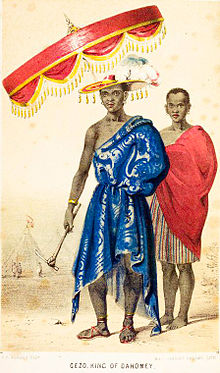Ghezo
| Ghezo | |
|---|---|
| King of Dahomey | |

King Ghezo depiction in 1851 publication
|
|
| Reign | 1818–1858 |
| Predecessor | Adandozan |
| Successor | Glele |
| Died | 1858 |
| House | Aladaxonou |
| Father | Agonglo |
Ghezo or Gezo was a King of the Kingdom of Dahomey, in present-day Benin, from 1818 until 1858. Ghezo replaced his brother Adandozan (ruled 1797 to 1818) as king through a coup with the assistance of the Brazilian slave trader Francisco Félix de Sousa. He ruled over the kingdom during a tumultuous period, punctuated by the British blockade of the ports of Dahomey in order to stop the Atlantic slave trade. Ghezo finally ended Dahomey's tributary status to the Oyo empire but also dealt with significant domestic dissent and pressure from the British to end the slave trade. He promised to end the slave trade in 1852, but resumed slave efforts in 1857 and 1858. Ghezo died in 1858, possibly assassinated, and his son Glele became the new king.
Ghezo was a son born with the name Gakpe to King Agonglo and was a younger brother to Adandozan. When Agonglo died, there was a succession struggle between his sons before Adandozan was enthroned. An oral tradition which developed during Ghezo's rule to largely erase Adandozan from official history say that Adandozan was merely named regent who refused to step down for Ghezo when he was old enough, but this is generally doubted by historians.
Information about the final years of Adandozan's administration is very limited, providing only a partial understanding of the situation that resulted in Ghezo's rule. What is known is that around 1818, Adandozan imprisoned Francisco Félix de Sousa, a powerful Afro-Brazilian slave trader, when the latter demanded repayment for money loaned to Adandozan. With the help, reportedly, of Nicola d'Olveira, the son of the Afro-Dutch wife of Agonglo, de Sousa escaped from imprisonment and relocated to Grand-Popo. While in exile, de Sousa sent gifts and money to Ghezo that Ghezo used to establish support for a challenge to the throne. In the 1818 Annual Customs, it is said that Ghezo appeared holding the war drum in the palace and upon seeing this the Migan and Mehu (prime ministers) removed the royal sandals from Adandozan and named Ghezo the king. It is quite likely that the initial struggle was more violent than this story relates. According to some versions, Ghezo was not named the ruler at this point, but instead the regent to rule until Adandozan's son, Dakpo was old enough to rule. The story says that this lasted until 1838 when Ghezo instead named his son, the future king Glele, the crown prince, and at that point Dakpo and Adandozan led a brief fight within the palaces. The fight resulted in a fire that burned part of a palace and killed Dakpo which made Ghezo the clear king of Dahomey.
...
Wikipedia
